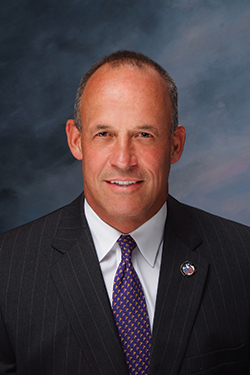See You at the Polls!

Since this edition of iBi hits the street very early in the month, I’d like to emphasize the importance of the April 5th consolidated election and the need for a large voter turnout. We will be going to the polls to elect five at-large city council members, District 150 school board members, and trustees of the Peoria Park District and Illinois Central College.
As mayor and as a citizen, I am interested in all of these elected offices. But the most important in terms of determining the direction and quality of governance for the City of Peoria is the election of the five at-large council members. This is a critical election, and there are clear distinctions among the 10 candidates. Three are incumbents with a fair amount of name recognition. Readers will recall that at-large council member George Jacob is unable to run, as he is recovering from a serious accident, and Jim Montelongo decided not to seek re-election. While the incumbents and I don’t agree on all matters, I don’t for a moment question their conviction or dedication to our community. These are difficult times for on-the-job training.
Our municipal elections have a unique feature called cumulative voting. This allows the voter to cast up to five votes and split their votes among the candidates if they so choose. Without arguing the merits or shortcomings of cumulative voting, it is a key reason why I believe that a larger voter turnout will likely mean a more balanced, community-oriented and experienced council. And herein rests my main concern.
If you review past municipal elections, you will see that we experienced a low turnout of eligible voters. In 2001, the percentage voting was 32.5 percent. This dropped to 24.3 percent in the 2009 municipal elections. No matter how you cut it, a small number of our eligible voters—not even a solid third in 2001 or a quarter in 2009—determine the makeup of the governing body of our “corporation”…a municipal corporation employing 700 people, spending $165 million in taxpayer dollars, and determining overall quality of services to our 115,000 “customers.” We can and must do better.
It is not my purpose here to analyze why more voters don’t exercise their privilege to vote. There are all kinds of reasons: overall apathy, a dislike of politics, or just being too busy (or lazy). But as chair of our council meetings, I observe that large numbers of citizens get riled up over issues like zoning, historic preservation, budget reductions, approval of incentives for residential and commercial development, and so on. When we conduct public hearings on such matters, our fellow citizens show up in droves, speaking to the issue and lecturing those of us who have the courage to stand for public office. (I wonder if those attending are among the 24 percent who voted, or the three-quarters who didn’t.) And this is fine, because that is what local government is all about.
We are the government nearest the voters, and they can—and do—literally touch us on a daily basis. Of course, you can write or call your federal or state legislators, but can you stand up before the entire elected body and express your views, frustrations and feelings? And it is this very fact of closeness and accessibility that should produce huge numbers of voters on April 5th. Those we elect locally impact the basics of our daily existence: law enforcement and nuisance abatement, street maintenance and snow removal, fire suppression, garbage pick-up, code enforcement, building inspections, emergency communications, neighborhood improvement, land use planning and many more.
When we look at the world around us, especially in those countries where masses of people are expressing their desire for social liberties, civic freedoms and economic opportunities, we should be thankful for our representative democracy. The right to democratic self-government is one of the bedrocks of our free society. But we can only work to insure its sustainability for future generations, if we participate in elections and preserve those rights of self expression and choice.
All this begins at the local level. Your city council endeavors to do the best job it can in deciding tough matters like the allocation of scarce tax dollars—so much to do with so little! By voting on April 5th, you can demonstrate your commitment to efficient and effective local governance. You also do your part to preserve the rights and blessings we have to live in an open, free and self-governing society. We can’t take that for granted. Please remind your family and co-workers to get out and vote, too.
See you at the polls! iBi

